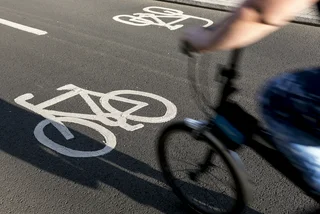The official bike-to-work (Do práce na kole) initiative in Czechia gets underway today and will last for the whole month. Its purpose is to encourage the public to use more sustainable forms of transport and lower pollution.
Due to popular demand, the deadline for participation has been extended to May 7.
More than 50 cities will participate in the scheme, which is organized by the AutoMat association and has been running for several years.
Organizers: Czechia needs better cycling roads
The company also calls for better cycling infrastructure in Czechia’s cities. AutoMat is currently appealing to the government to help increase cyclists’ and pedestrians’ safety.
AutoMat public relations co-ordinator Anna Kociánova"Among the most common reasons why people do not cycle around Prague is the fear of moving between motor vehicles. Experience from abroad shows that a high-quality and safe infrastructure for pedestrians and cyclists is much more fundamental in changing traffic behavior than, for example, the weather"
The scheme does not limit people to just cycling, however. Organizers of the event encourage participants to use scooters, skateboards, and rollerblades – or simply jog or walk.
Those who are interested can sign up via the official website. A registration fee of CZK 520 applies, which includes a T-shirt and entry into a competition with prizes. Employers can also fund participants under the scheme; almost 75 percent of those taking part have their entry fee paid by their work.
KvÄ›ten je tradiÄnÃm mÄ›sÃcem pro výzvu Do práce na kole. Letos jsem se poprvé pÅ™ihlásila, ne abych pÅ™esedla z auta (jezdÃm MHD), ale abych si vypracovala pravidelnost ježdÄ›nà na kole. DÃky @spolekautomat za zahajovacà snÃdani!#dpnk pic.twitter.com/QLKGEe2yIl
— Barbara Majovská (@BarbaraMajovska) May 2, 2023
Track your rides and win prizes
Participants will be able to record their journeys on their Do práce na kole profile or on third-party exercise applications, such as Strava. People can sign up and take part individually or join as a team of colleagues.
The May 2022 challenge involved almost 25,000 people, making it the most popular edition so far. Participants collectively covered 6.3 million kilometers and saved over 800 tonnes of carbon dioxide compared to the same journeys that would have been made by car.
Those with a “regularity score” of over 66 percent (taking part for at least two-thirds of the working days in May) will enter a draw with valuable prizes.
This year, the challenge was also held for one week in January, and a further installment is planned for September.
Cycling is becoming more popular in the capital – a study by the city’s government found that the number of regular cyclists increased by 73.4 percent between 2019 and 2021. There are about 330,000 people in the capital who cycle more than once a week at the moment.
Amid Czechia’s current aims of reducing its greenhouse-gas emissions, AutoMat and other environmental groups hope that the current scheme encourages people to be a little greener.












 Reading time: 2 minutes
Reading time: 2 minutes 



























